The legend of the Garlic Mansion
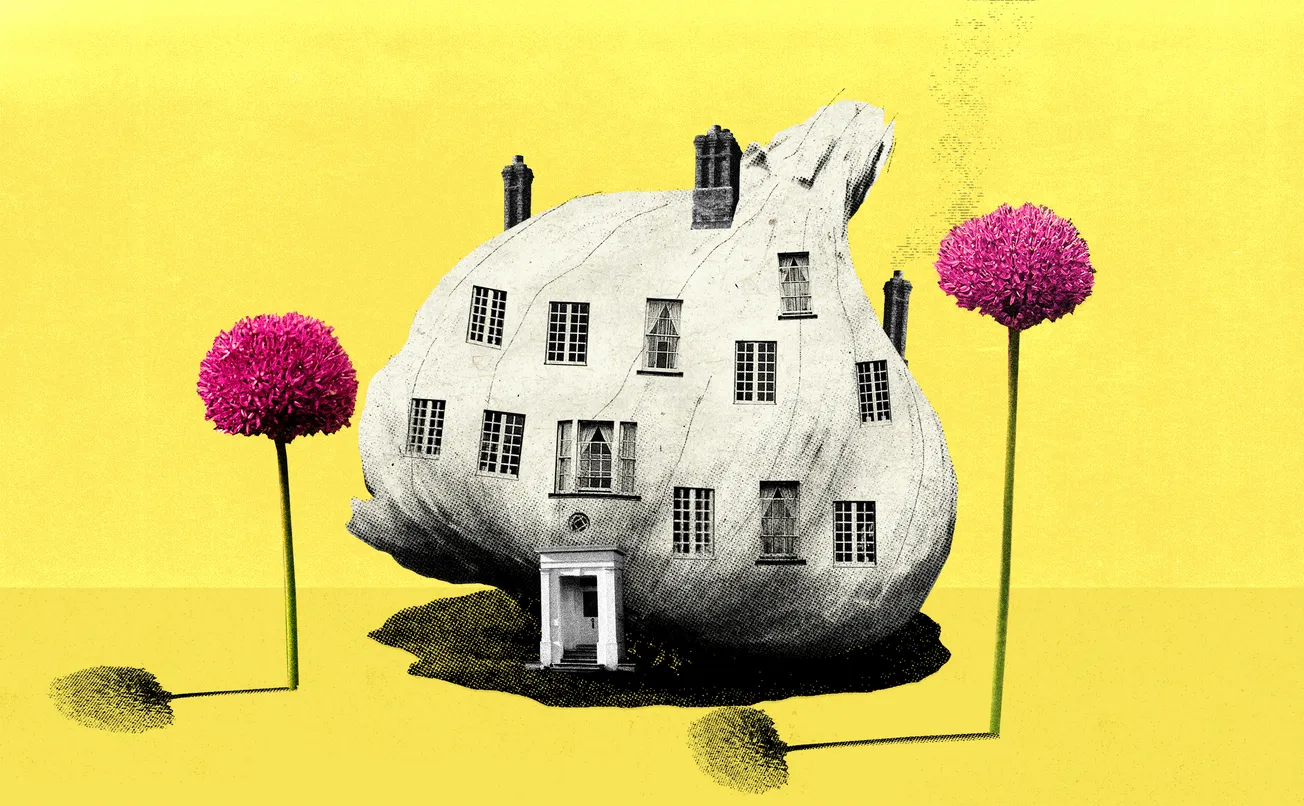
Courtney Love stayed there, the rent remains at Nineties prices and it's acquired mythical status. What's the magic?
Hello there! While this story is free to read, The Post is funded entirely by just under 2,000 loyal paying subscribers who help us write journalism like this. If you've been enjoying our work and you believe in the importance of quality local journalism, please join up now for just £1 week.
In return, you'll get access to our entire back catalogue of members-only journalism, receive all our extra editions per month, and be able to come along to our fantastic members' events. Just click that button below.
Like nearly all who pass through its doors, Ryan remembers the first time he spent a night at the Garlic Mansion. It was 2015; then 25 he was the frontman of indie rock band Hooton Tennis Club. He’d travelled from Chester to play a gig at the Kazimier with his friends, Liverpool band Stealing Sheep.
After the gig, an obligatory lock-in: pints were consumed, music played and stories exchanged. Ryan looked at his watch. Shit. What had felt like an hour had actually been three. He’d missed the last train home. But the panic that washed over him was soon quelled when a fellow musician thrust a small set of keys into his hands and reeled off an address.
It was the early hours when Ryan arrived outside a large brown house buried in the Georgian Quarter. Jelly-legged, he fell through its apple-red door and staggered into the basement, where a bed lay waiting. When he awoke the next day, sore-headed, Ryan crept up the stairs to piece together exactly where he was.
Emerging onto the landing, he tripped over piles of books lining each step of a rickety white staircase. Dreamcatchers dangled from the ceiling, bracelets and beads adorned the banisters, and strange fluorescent artworks were stacked in corners. Making his way into the living room, Ryan was mesmerized by the sight of hundreds of postcards, bearing postmarks from the likes of Mumbai, Mexico and Canada, plastering the walls around him.
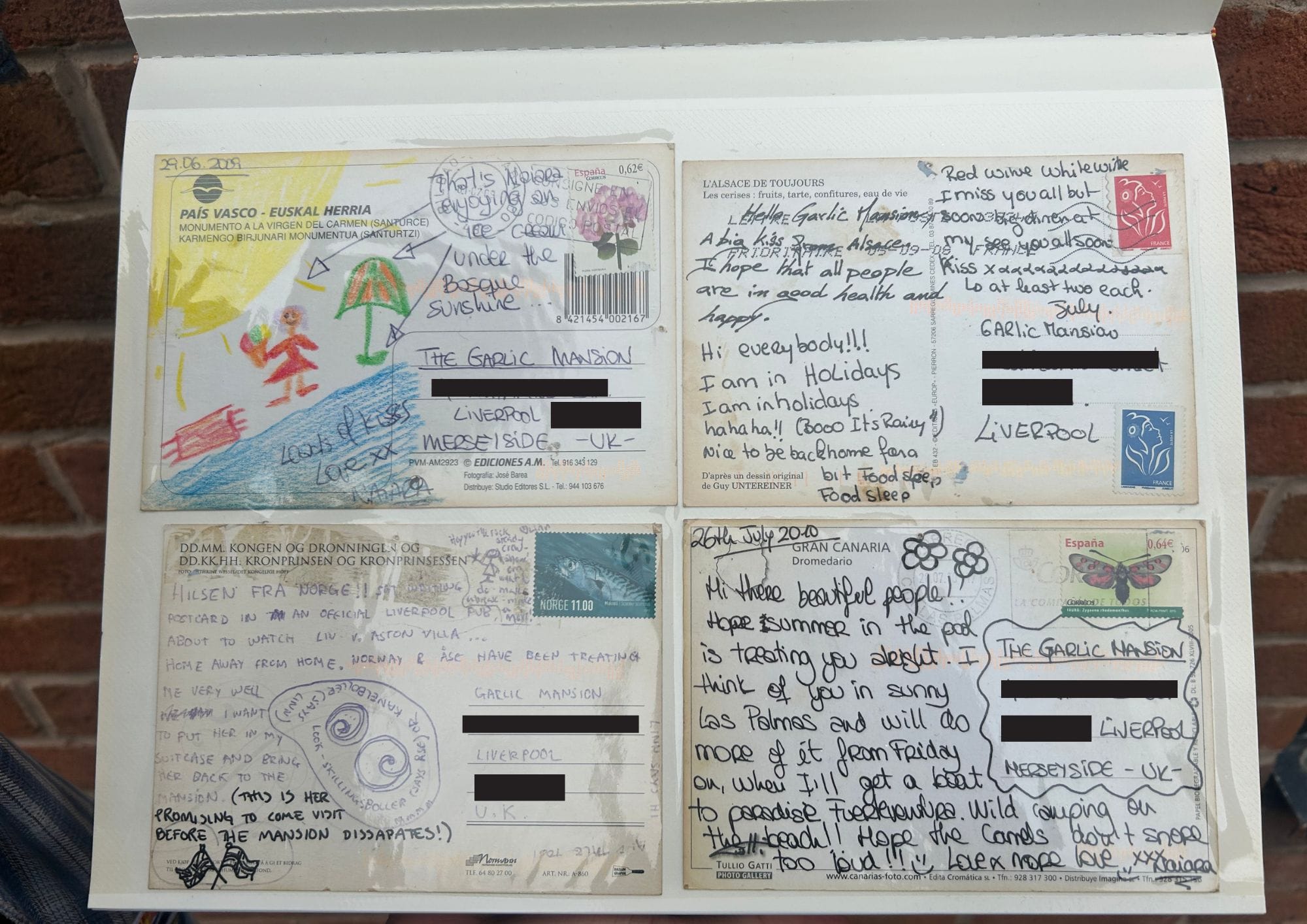
“I immediately rang my friend and was like, 'mate, I'm in this house in Liverpool and you've got to come and see it right now’,” Ryan tells me. His friend, less enthused by the bohemian heaven Ryan had stumbled into, refused to make the 30-minute Merseyrail trip.
But for Ryan, it was love at first light. He’d uncovered one of Liverpool’s best kept secrets: the Garlic Mansion.
Where this 19th century house got the moniker ‘Garlic’ from, no one is quite sure. Theories include: it was once home to a man named ‘Sam Garlik’; previous residents hosted a strange Halloween party where everyone turned up draped in the herb; the mansion is in close proximity to a patch of wild garlic. Regardless, for the past three decades its residents have been affectionately known as Liverpool’s “cloves”.
If you’ve spent any time among creatives in the city, you’re bound to meet someone who has done a stint in the Garlic, or at least knows someone else who’s lodged there. The house itself is wrapped up in legend; the place has — allegedly — hosted DJ sets from all seven members of Aussie rockers King Gizzard and the Lizard Wizard, and counted luminary residents such as Hole frontwoman Courtney Love, and acclaimed poet Carol Anne Duffy.
Riotous gigs have been held in its ramshackle living room, house parties so large they feel like a scene from Human Traffic, and dozens of painters, writers and artists have used the place as a spiritual pitstop. In fact, the house has now become so well respected that it appears on a map in Liverpool’s Rough Trade, recognised as a bastion of music and art.
The origins of the Garlic are prosaic. First purchased in 1992 by mortgage broker Carl Watson, the property was intended to be a student digs, with new teens moving in each academic year. However, within a matter of months Carl received a phone call from its first set of tenants, expressing their love for the place and asking to stay on after the term finished. They’d take care of the comings and goings of residents, they assured him, and make sure the house remained in safe hands.
From that moment on, the house — in Carl’s words — “took on a life of its own”. It soon became inhabited by young people from all across the world. As Carl tells it, the ‘Garlic’ nickname is thanks to the international and garlic-infused meals that were cooked up in its kitchen (though of course, this is playfully disputed by half a dozen other theories dictated to me by past and present tenants, who each have their own story about the name’s origin).
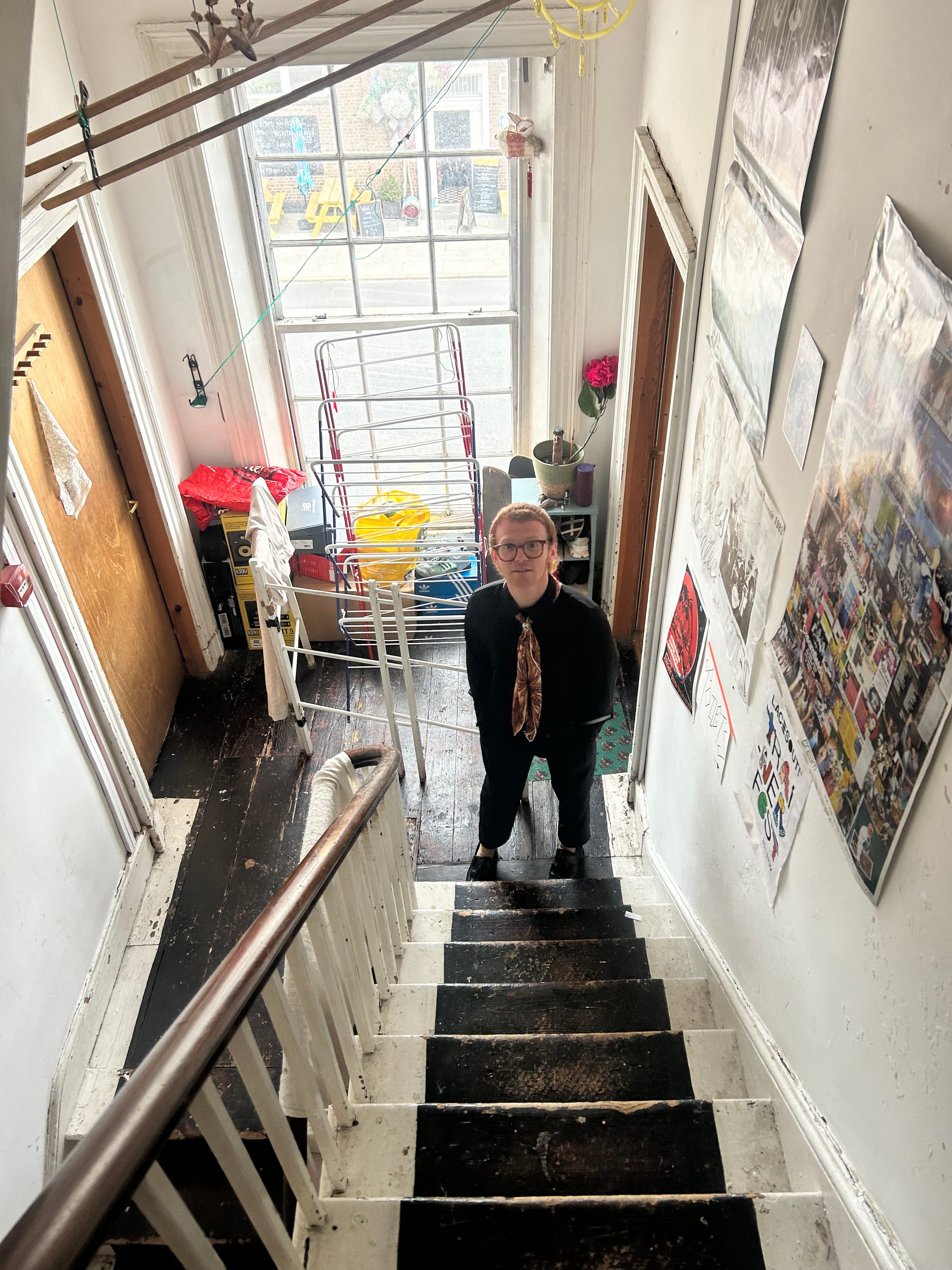
Despite carrying the tag of ‘mansion’, the Garlic is smaller than you might think. Although eight bedrooms — ranging from boxes to doubles — are spread across three floors and a basement, the house is tightly wound around its staircase, with numbers scrawled in black marker on each step. Those who’ve inhabited the Garlic the longest get first dibs on the larger of the eight spaces, while new tenants stay at the top of the house — the “Crow’s Nest” — in smaller rooms, until they’ve earned their stripes.
Downstairs to the right, there’s a modestly sized living room with a mid-century wooden dining table pressed against the window. A turntable is tucked away in the corner, while two dusty sofas take up the rest of the space, littered with colourful cushions and blankets. Carry on right and you hit a small kitchen, and while images of the sink from Withnail and I had been swirling around my head I was pleasantly surprised to find it cleaner than I prepared myself for. Maybe the occupants have tidied up for my visit —there's only a handful of dirty dishes stacked on the counter, the rest piled neatly in worn brown cupboards.
After Ryan’s accidental sojourn at the Garlic in 2015, he couldn’t get the place out of his head. Here was a ripe opportunity to spend his days among other young creatives, swapping song ideas and living out the hipster dream. So, when longtime tenant and puppeteer Katy-Anne announced she’d be moving out of her room, Ryan knew it was his destiny to be a ‘clove’. But first, he had to navigate a rigorous interview process every prospective Garlic tenant was subjected to. Candidates were invited to a house meeting to be quizzed about their hobbies, ambitions and lifestyle, before a democratic vote took place to decide who is in — and who is out.
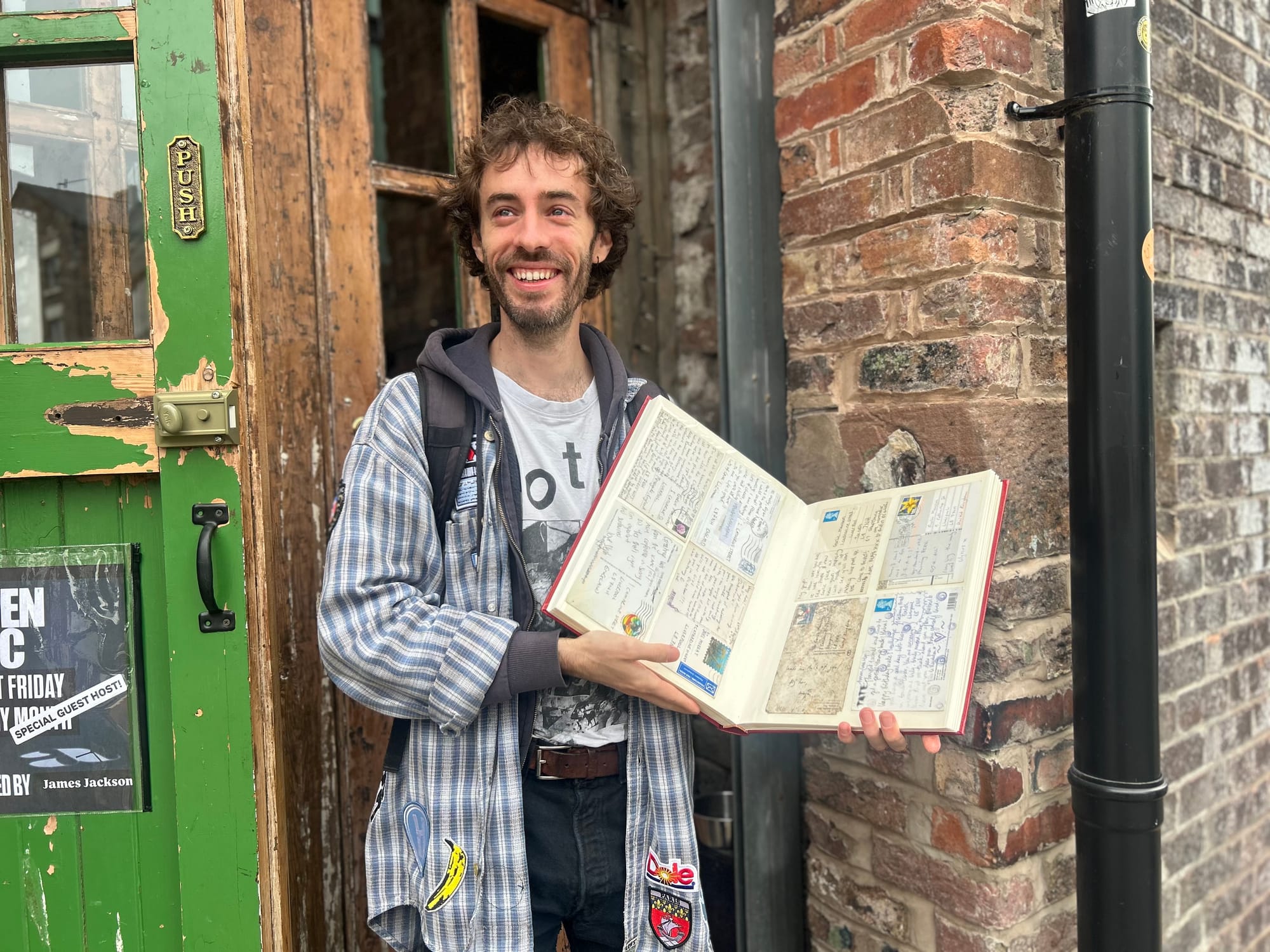
Luckily for Ryan, he had a rather familiar relationship with another one of the Garlic’s tenants, Colin. Years prior, the pair had taken part in a performance for the band Stealing Sheep, which required two unlucky folk to climb into a Chinese dragon costume. Colin lucked out — with a toss of a coin, he was the dragon’s head. Ryan wasn’t so lucky. He became, for all intents and purposes, Colin’s arse.
After recounting that story, and a few hours of private deliberation by the Garlic crew, the verdict was in: Ryan was officially a clove. “Honestly the whole thing felt a bit elitist, like a cult,” Ryan laughs. “But it makes sense, because there is a very certain type of person who can live there.” What kind of person are we talking about? I ask. He pauses for a while. “The biggest personality trait for a clove is tolerance”.
In the subsequent seven years Ryan lived at the Garlic, he says the place resembled more of a raucous music venue than a home, with only the most understanding of tenants surviving the storm. He recalls walking down Bold Street in early 2016, and spotting one of his housemates flyering for a big gig she was putting on. The poster listed the address of said gig: the Garlic Mansion’s living room.
“I told her it was insane, this can’t happen at our house,” he says. Did it? He laughs. “Of course it did.”
In addition to the living room gigs, there were also the regular parties that literally shook the house’s foundations. Ryan recounts one particularly heavy session, where a noise rock band took over one of the bedrooms on the second floor, a receptive audience packed in like sardines.
“The room below was full of people, and they were looking up and they could see the ceiling caving, literally bouncing up and down,” he says. “Obviously the house must be very well built because it's still standing after all this time”.
Like what you're reading? You can get two totally free editions of The Post every week by signing up to our regular mailing list. Just click the button below.
It’s now been three years since Ryan left the Garlic, moving back home to Chester to stay with his parents. Since then, the house has entered a new era, shifting from the chaos of Ryan’s time to a more subdued way of living. The famous postcards that collaged the walls of the living room have been taken down, replaced by drawings, paintings and a large mirror. It’s quiet and tidy now — slightly more grown up.
I speak to Will and Jess, both in their mid-twenties and fairly new tenants to the Garlic. The intense process to find new roommates doesn’t exist in the way it once did; both Jess and Will were already friends with a handful of the current tenants, and a few text messages was all it took to give them the go-ahead.
Will moved in just a few months ago, and while he’d been to a number of action-packed parties at the Mansion before — he describes the events here as “what you’d show to an alien to help it understand what a house party is” — he insists that the day to day is a fairly calm existence.
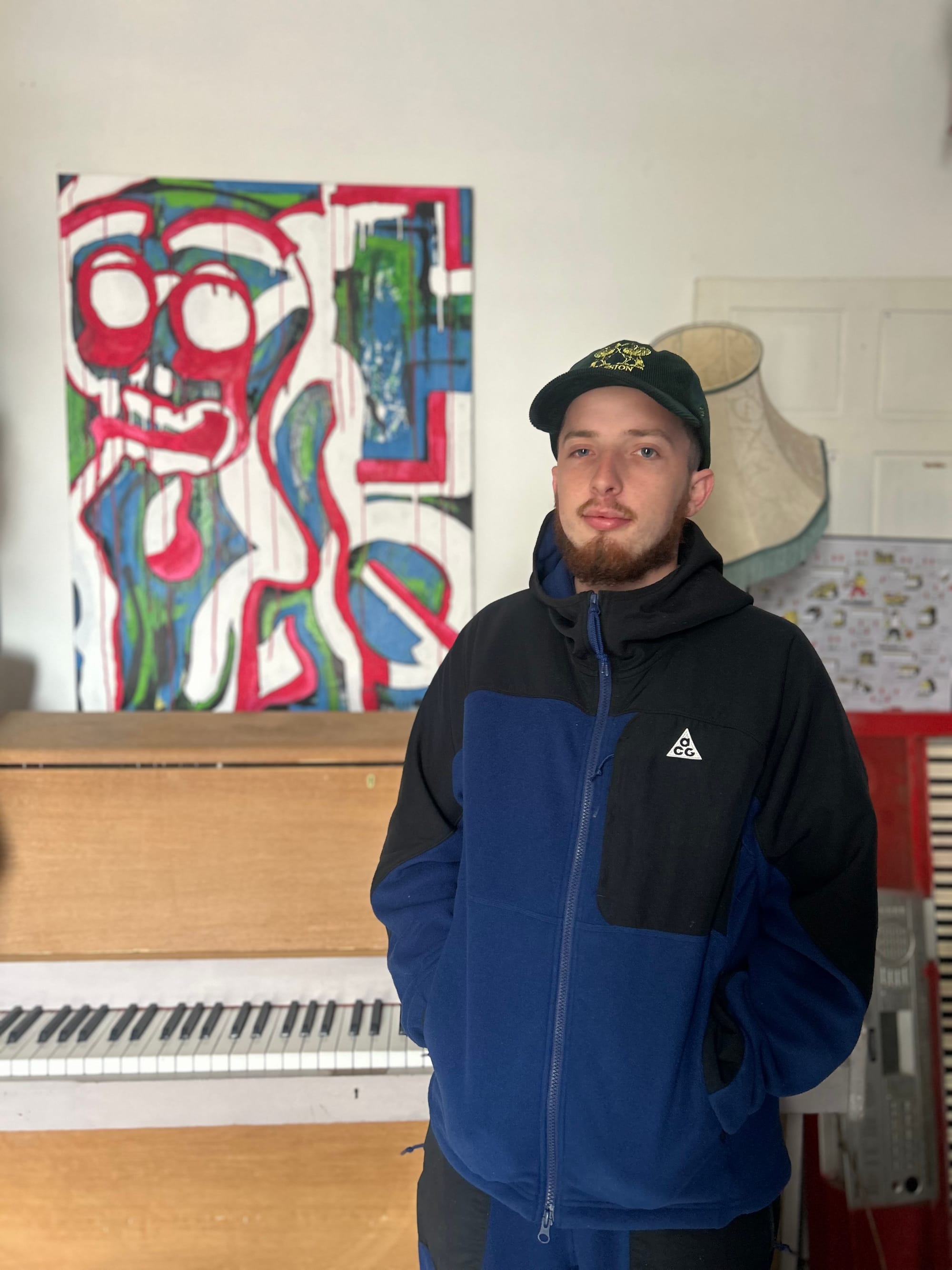
Will’s room, located on the second floor, is a little messy, but filled with electronic music equipment, vinyl records and a small piano tucked in the corner. He’s pursuing his career as a producer and artist, and the cheap rent here (still around £300 a month — the average rent for a room in the Georgian Quarter is £500 if you’re lucky) allows him to focus on his craft rather than stressing about bills.
“I don't think many houses, if any, in Liverpool have evolved with a good rent and elite location,” he says, “and credit to [the landlord Carl] for maintaining that, because this could easily be given a lick of paint and you could charge way more”.
Jess has lived here a little longer, moving in around Christmas-time last year. Unlike most in the house, she doesn’t class herself as an “artist”, instead working as a barmaid in a venue in town. Despite this, she says she feeds off the creative energy, and it was this that made her want to move in.
“I’m like the only person who’d never really been to a party here before I moved,” she laughs. “But I was fascinated thinking about everyone that used to live here. It just seems like a rite of passage for so many people.”
Like many of the newer tenants, she doesn’t know the ins and outs of who used to inhabit the Garlic, and the stories its walls hold. But there are echoes of the past throughout the house. I learn that the piano in Will’s room once belonged to Ryan, and the etchings on a wall up in the Crow’s Nest depict a quote from the metaphysical poet John Donne — a favourite of former clove, Carol Ann Duffy. The books that remain littered throughout the house bear the names of those who owned them in a past life, scratched into the inside covers.
I speak to Ollie, one of the two remaining tenants from Ryan’s time living in the Garlic. He’s been here five years now, and while he’s made attempts to move out on a number of occasions — looking to move to London and make new connections — “the house has a way of bringing you back”. Of course, he remembers it in its party-fuelled heyday (his birthday party just two years ago was a spectacular occasion with floor to ceiling speakers and a whole roster of DJs rocking a living room stuffed with people), but he too feels the house has entered a new phase.
Ollie’s seen a dozen tenants come and go over the years, and as he’s grown older he’s prioritised his work as a musician over the chaos of partying. Thankfully, the latest influx of tenants feel the same way — they all enjoy the quieter environment that now feels “more like a home than ever”.
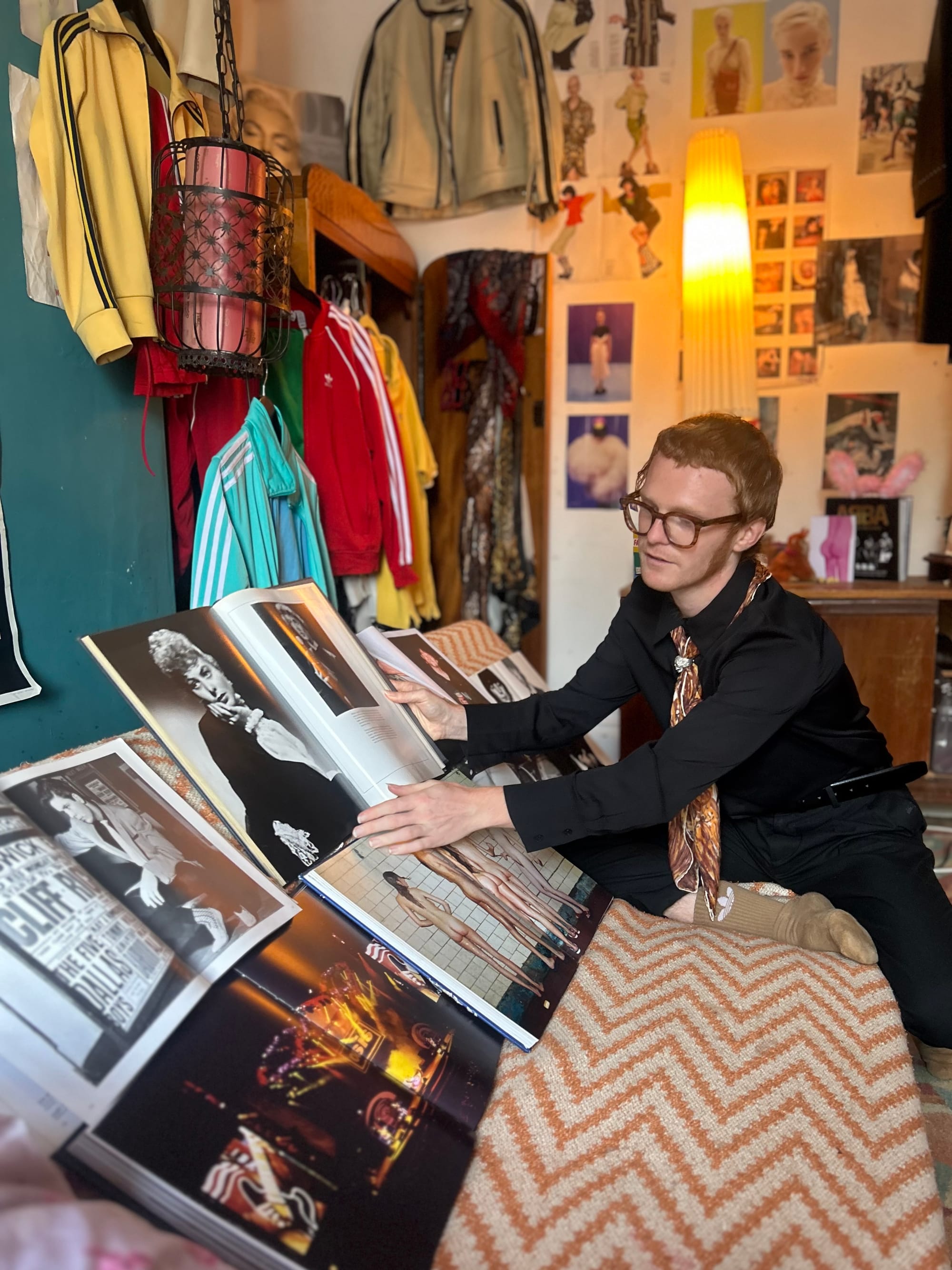
“It's not all about work and music, it's just about real people and I think that's like the big one for me,” he says.
It’s a sentiment Ryan echoes too. “It’s just a house at the end of the day,” Ryan says, “it should be somewhere that people can rest, they can come home, sit in the living room, have a cup of tea”.
The cultural significance of the Garlic Mansion doesn’t evade Ryan though. During his time living there he didn’t quite understand why the place was so important, but now he looks back and sees things in a different light. “It’s really quite a special place,” he says, noting that while there are probably versions of the Garlic Mansion in Manchester, Leeds or Sheffield, it’s unlikely there is a house that holds quite as much history — and quite as much fame – as the Garlic.
In a world where it is getting harder for creatives to thrive, the Garlic Mansion gives its residents an opportunity to experiment, to make mistakes and be inspired by each other’s art. “I don’t think there’s many places like it, in terms of a home that’s also a creative practice,” Will says. While there are clubs that DJs frequent, dive bars that guitarists drink in and community clubs dancers practice in, seldom do you get a space that ties those people together. “Here, through naturally trying to find a place to live, we’ve created such diversity,” Will says, “and I think that’s really cool.”
As time goes on, and the lore around the Garlic Mansion beds in deeper, its gravitational pull for young creatives continues to grow. In some ways — thanks to the rise of social media and its newfound fame on the map in Rough Trade — the house in itself has become the celebrity it once sheltered. “Its success and career thrives off kind of being in the public eye, right?” Ryan says. “But at the same time when you ask celebrities what they value, they’d say their privacy”. In his mind, for it to go on existing the Garlic must balance this duality of fame and reclusive solitude.
Enjoyed this edition? You can get two totally free editions of The Post every week by signing up to our regular mailing list. Just click the button below. No cost. Just old school local journalism.

Comments
Latest
Is Liverpool resting on its laurels?
From Hoylake to St Helens, community cinema is making a comeback
Millions of tonnes of greenhouse gas to be piped under Liverpool Bay
The unexpected auction: A London fund manager is selling Merseyside homes from under their tenants
The legend of the Garlic Mansion
Courtney Love stayed there, the rent remains at Nineties prices and it's acquired mythical status. What's the magic?